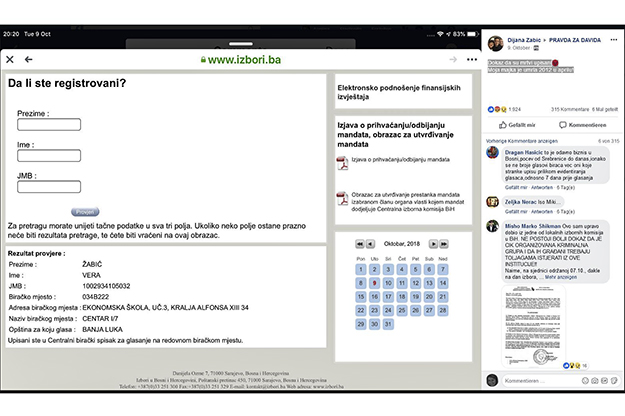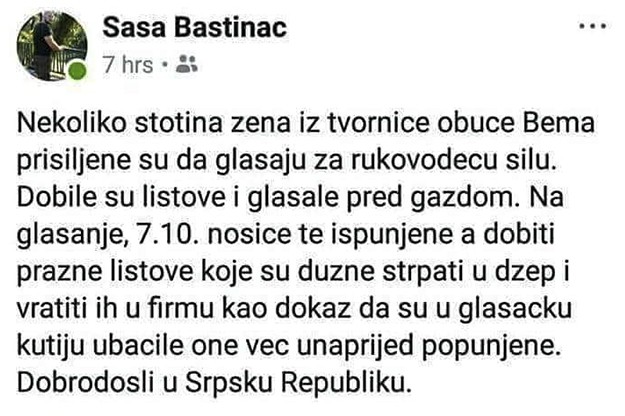The final results of the 2018 General Elections in Bosnia and Herzegovina (BiH) are expected in early November, but what is already evident now is that no big changes have taken place and that these elections do not carry any surprises.
According to the Central Election Commission (CEC), 51 percent of citizens who were registered for elections exercised their right to vote. Whether changes did not occur because of citizens’ satisfaction with the current government, because of irregularly conducted elections, omnipresent clientelism or political apathy, are questions that remain open.
What I intend to do here is to raise a series of questions, complaints and ambiguities related to the electoral process itself, in which a series of irregularities appear to have taken place.
Who votes in the elections in Bosnia?
The ambiguities begin with the number of registered voters and the question of how it is possible that the number of voters is greater than the number of inhabitants. For the umpteenth time, complaints about the deceased on voter lists and undelivered ballots abroad continue. Vote-buying is a public secret, as well as the distribution of pre-filled ballots. There were also media reports of the theft of both empty and filled ballots, at all levels of government, and the number of invalid ballots is about half a million, or 7 percent.
On August 23, when the Central Electoral List closed, according to the CEC there were 3,352,933 registered voters, while according to the latest census of the population conducted in 2013, the total number of inhabitants is 3,531,159. As I was told by the CEC, they receive data on the number of voters from the BiH Agency for Identification Documents, Records and Data Exchange (IDDEEA BiH) and consider them relevant, while census data are irrelevant for them.
It is clear that these data can not be identical, and that the diaspora is not included in the census, but the deviations are still significant, especially when it is known that around 78,000 voters are registered to vote abroad either through mail or at the diplomatic branch offices.
This is, of course, directly connected to numerous complaints about the high number of registered deceased people who voted, as well as those who are no longer citizens of BiH. Although complaints were received even before the election, and although they have been repeated for many years, these irregularities have unfortunately not been corrected, nor are the reasons why they appear.
This indicates either the CEC’s inability to correct the mistakes, or actually knowledgeable misuse of these ballots. A large number of complaints of this type are evident in the media and on social networks, and citizens are submitting evidence of the registration of long time dead people.

Dijana Žabić: “Proof that the dead are registered. My mother died in April 2012!” Photo taken from social media.
I am among those voters who are registered to vote by mail, but I never received ballot papers from the CEC. The CEC accused the Austrian post office, and the Austrian post office is not authorized to give me, as a recipient, any information. The CEC did not intervene in regard to this issue, of course. The only answer it offered is that they have sent the ballots and that they are no longer interested in anything else. According to them, with this action (sending a ballot by mail), their part of the job was completed.
Random error?
After the votes are counted, it is possible to find out, by written request, whether someone has misused my voice, and I definitely intend to do that. Even the CEC itself, before the elections, expressed concern about the possible misuse of personal identification documents and forged signatures during registration process for voting outside the country.
After my appearance in regard to this issue on N1 TV, I received a lot of messages in which citizens from abroad complained about the same problem. This again indicates that this is not a single, accidental mistake.
There is a suspicion based on citizens’ statements that printing houses “Atlantik bb” from Banja Luka, in cooperation with the companies Nezavisne novine, RS Official Gazette, Grafomark from Laktaši, and Farma prom from Banja Luka (which were in charge of printing of ballots), printed a greater number of ballots than was needed. These ballots would be filled by parties that are already in power and have the necessary infrastructure for this fraud, and then shared at the entrance of the polling stations.
According to the accusations, those who were picking up completed ballots were bringing back empty ones to the organizer of the so-called ‘Bulgarian train.’ Then everything would continue to go in a circle. Voters would submit already pre-filled ballots and take the empty ones to organizers who would fill it for the next round.
The answer to the question, why would a voter do it, is quite simple. Elections in Bosnia and Herzegovina are largely based on clientelism. Anecdotally, the group that most regularly participate in elections, i.e. vote, is the one that is employed in the public sector. It votes for its own existence, which directly depends on the political elite in power.
The electorate are not offered programs or quests for change, they vote for those who provide the only secure jobs in the country, those who are paid from the budget, whether cantonal, entity or state. Change in government structure would also result in a change in the structure of employees.
The second category of the clientelist system are workers in factories whose owners are close to the governing structures and they are the target group that most often gets filled ballots. This seems to be a combination of inherited socialist and newly established (neo)liberal democracy, in which if you are not in the party and for the party you can not exercise certain rights, and all of that is related to the specific channelling of capital.

Reports surfaced on social media of factory workers being forced to vote in line with their employers interests, including this one made by Saša Baštinac. Photo taken from social media.
Vote-buying is also not a novelty and prices range from 50 to 200 BAM, as I was told by someone who observed the election process in Bosnia and Herzegovina. The money is received after the provided picture with filled ballot at the poll, before it is put in the ballot box. The most favorable variant is the one with an ID (identification document) and a completed ballot. Such photographs with a ballot and an ID card are often enclosed to the superiors by public sector employees.
Most of the interlocutors of the Election Observation Mission (EOM) at the Office for Democratic Institutions and Human Rights (ODIHR) have expressed doubts before elections about the impartiality of the electoral administration on a political and ethnic basis, as well as fear of manipulation.
Of the approximately 1.7 million voters who voted on four ballots, almost 500,000 were declared invalid. There is a possibility that those who worked as counters of ballots and were put by someone on behalf of the political party in committees, annulled the ballots of competing candidates and the parties, and therefore falsely counted the votes. There are indications, according to the media, that the ballots were stolen and destroyed during transportation from the polling station to counting sites, as the CEC did not provide it.
This requires logistics that are not available to smaller parties, because it includes a series of criminal actions that demand serious organization. In addition to privileged media access and preferential treatment of candidates that are currently holding office, there is an additional clientelist infrastructure available to them.
The answer to the question on why they are using such means, in addition to all the benefits and levers of power that they already have to begin with, can even be positive. Because they are afraid that otherwise they could lose the elections.
If democracy failed in the election process, this is a sign that the current government, without manipulation, coercion and theft probably would not be held in power. It might be paradoxical, but this theft gives us the optimism that not everything is lost yet.
Feature image courtesy of Central Election Commission Bosnia and Herzegovina.



